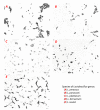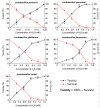Hydrogen Sulfide Effects on the Survival of Lactobacilli with Emphasis on the Development of Inflammatory Bowel Diseases
- PMID: 31756903
- PMCID: PMC6995546
- DOI: 10.3390/biom9120752
Hydrogen Sulfide Effects on the Survival of Lactobacilli with Emphasis on the Development of Inflammatory Bowel Diseases
Abstract
The gut microbiota is a complex component of humans that depends on diet, host genome, and lifestyle. The background: The study purpose is to find relations between nutrition, intestinal lactic acid bacteria (LAB) from various environments (human, animal intestine, and yogurt) and sulfate-reducing microbial communities in the large intestine; to compare kinetic growth parameters of LAB; and to determine their sensitivity to different concentration of hydrogen sulfide produced by intestinal sulfate-reducing bacteria.
Methods: Microbiological (isolation and identification), biochemical (electrophoresis), molecular biology methods (DNA isolation and PCR analysis), and statistical processing (average and standard error calculations) of the results were used.
The results: The toxicity of hydrogen sulfide produced by sulfate-reducing bacteria, the survival of lactic acid bacteria, and minimal inhibitory concentrations (MIC) were determined. The measured hydrogen sulfide sensitivity values were the same for L. paracasei and L. reuteri (MIC > 1.1 mM). In addition, L. plantarum and L.fermentum showed also a similar sensitivity (MIC > 0.45 mM) but significantly (p < 0.05) lower than L.reuteri and L. paracasei (1.1 > 0.45 mM). L. paracasei and L. reuteri are more sensitive to hydrogen sulfide than L. fermentum and L. plantarum. L. pentosus was sensitive to the extremely low concentration of H2S (MIC > 0.15 mM).
Conclusions: The Lactobacillus species were significantly sensitive to hydrogen sulfide, which is a final metabolite of intestinal sulfate-reducing bacteria. The results are definitely helpful for a better understanding of complicated interaction among intestinal microbiota and nutrition.
Keywords: hydrogen sulfide; inflammatory bowel disease; intestinal microbiome; lactic acid bacteria; sulfate-reducing bacteria; toxicity; ulcerative colitis.
Conflict of interest statement
The authors declare no conflict of interest.
Figures




References
Publication types
MeSH terms
Substances
LinkOut - more resources
Full Text Sources
Miscellaneous

